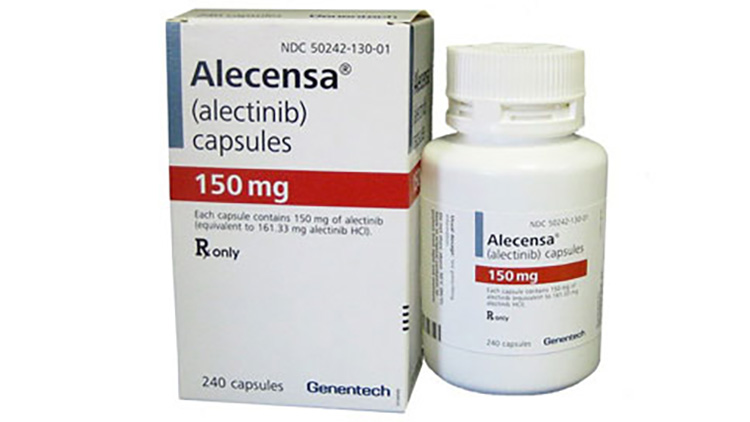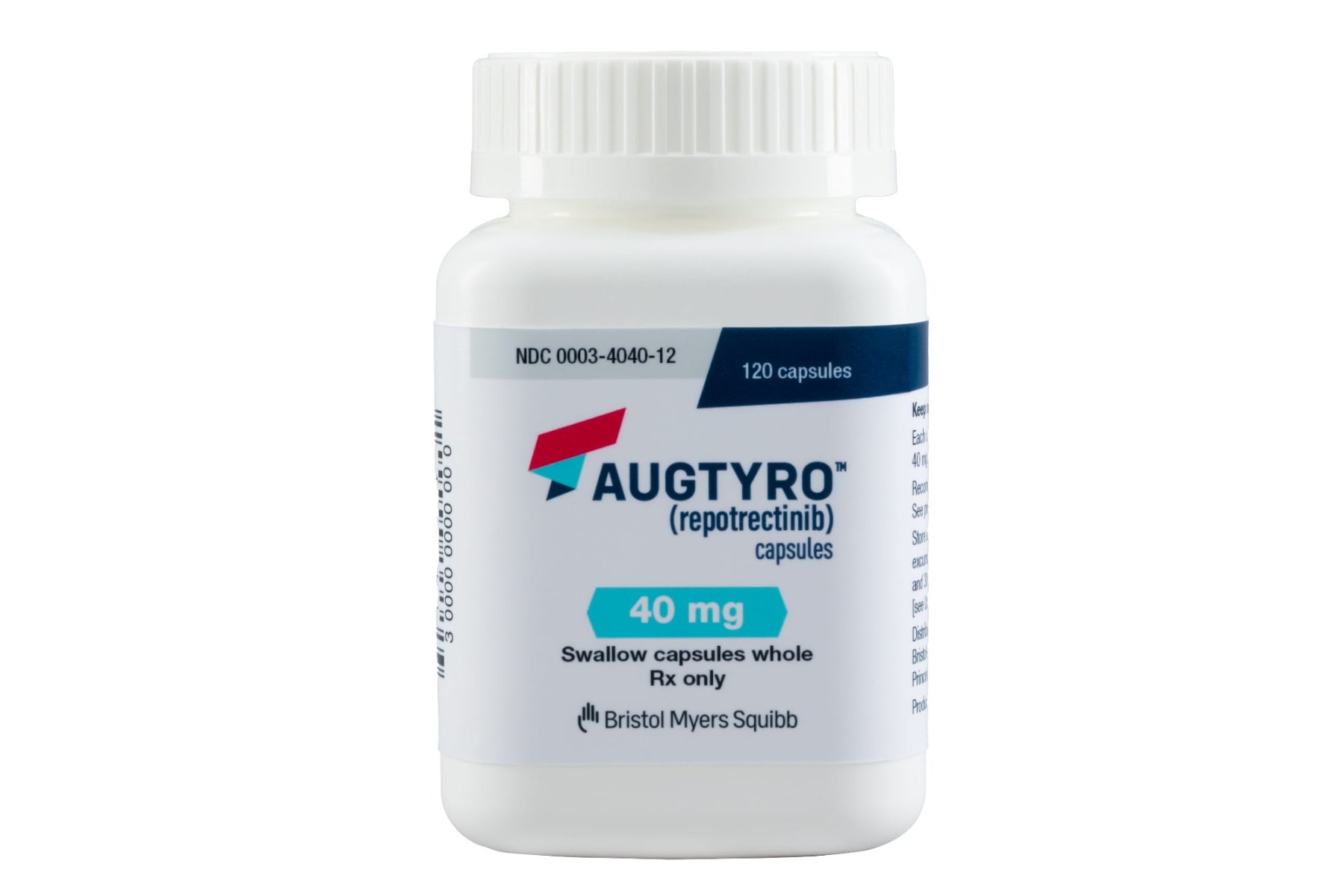Alecensa (alectinib) vs Augtyro (repotrectinib)
Alecensa (alectinib) vs Augtyro (repotrectinib)
Alecensa (alectinib) is an oral medication specifically approved for the treatment of ALK-positive non-small cell lung cancer (NSCLC) and has shown high efficacy in this subset of patients, with a favorable safety profile and the potential to manage brain metastases effectively. On the other hand, Augtyro (repotrectinib), which is under investigation and not yet approved as of the knowledge cutoff in 2023, targets ROS1 and TRK in addition to ALK, and is being studied for its effectiveness in NSCLC and other solid tumors with these mutations. When deciding between these medications, it is crucial to consider the specific genetic mutations present in the cancer, the drug's approval status, and the individual's overall health profile, as these factors will guide the choice of treatment in consultation with an oncologist.
Difference between Alecensa and Augtyro
| Metric | Alecensa (alectinib) | Augtyro (repotrectinib) |
|---|---|---|
| Generic name | Alectinib | Repotrectinib |
| Indications | ALK-positive metastatic non-small cell lung cancer (NSCLC) | Advanced solid tumors with NTRK1/2/3, ROS1, or ALK rearrangements |
| Mechanism of action | ALK inhibitor | Tyrosine kinase inhibitor targeting TRK, ROS1, and ALK |
| Brand names | Alecensa | Augtyro |
| Administrative route | Oral | Oral |
| Side effects | Fatigue, constipation, edema, myalgia, anemia | Not fully established; similar agents cause dizziness, constipation, edema, weight gain, anemia |
| Contraindications | Hypersensitivity to alectinib or excipients | Hypersensitivity to repotrectinib or excipients |
| Drug class | Tyrosine kinase inhibitor | Tyrosine kinase inhibitor |
| Manufacturer | Genentech (Roche) | Turning Point Therapeutics |
Efficacy
Alecensa (Alectinib) Efficacy in Lung Cancer
Alecensa (alectinib) is an oral medication specifically designed to target and treat non-small cell lung cancer (NSCLC) that is anaplastic lymphoma kinase (ALK) positive. The efficacy of Alecensa in treating ALK-positive NSCLC has been demonstrated in multiple clinical trials. A pivotal phase III trial known as the ALEX study compared alectinib to crizotinib, another ALK inhibitor, in untreated advanced ALK-positive NSCLC. The study showed that alectinib significantly reduced the risk of disease worsening or death compared to crizotinib. Additionally, alectinib has been shown to have a high level of activity in the central nervous system (CNS), which is particularly important as ALK-positive NSCLC patients have a high risk of brain metastases.
The efficacy of Alecensa is also supported by its progression-free survival (PFS) rates. In the ALEX study, the PFS for patients treated with Alecensa was markedly longer compared to those who received crizotinib. Moreover, the overall response rate (ORR), which measures the percentage of patients with a partial or complete reduction of the tumor, was favorable for Alecensa. The duration of response (DOR) also tended to be longer for patients treated with Alecensa, indicating sustained benefits over time.
Augtyro (Repotrectinib) Efficacy in Lung Cancer
Augtyro (repotrectinib) is a newer agent under investigation for the treatment of advanced NSCLC that is ROS1-positive or harbors a TRK fusion. As an investigational drug, repotrectinib has shown promise in early clinical trials. The drug is designed to be a potent inhibitor of ROS1 and TRK kinases, which are known to drive tumor growth in certain subsets of lung cancer. The efficacy of repotrectinib is being evaluated in ongoing clinical trials, and the available data suggests that it has activity against both treatment-naive and pre-treated ROS1-positive NSCLC.
In early clinical trial results, repotrectinib has demonstrated encouraging ORR in patients with ROS1-positive NSCLC, including those who have CNS involvement. The drug is specifically designed to overcome resistance to prior ROS1 or TRK inhibitors, which is a common challenge in the treatment of these cancers. As such, repotrectinib may offer a new line of therapy for patients who have developed resistance to existing treatments. However, it is important to note that as of the knowledge cutoff date, repotrectinib is still undergoing clinical evaluation and has not yet received regulatory approval for the treatment of lung cancer.
Regulatory Agency Approvals
Alecensa
-
European Medical Agency (EMA), European Union

-
Food and Drug Administration (FDA), USA

-
Health Canada

-
Pharmaceuticals and Medical Devices Agency (PMDA), Japan

-
Therapeutic Goods Administration (TGA), Australia

-
Medsafe (NZ)

Augtyro
-
Food and Drug Administration (FDA), USA

Access Alecensa or Augtyro today
If Alecensa or Augtyro are not approved or available in your country (e.g. due to supply issues), you can access them via Everyone.org.
How it works

Make an enquiry
Choose the medicine you want to buy, answer a couple of questions, and upload your prescription to speed things up. We’ll get back to you within 24 hours.


Make an enquiry
Choose the medicine you want to buy, answer a couple of questions, and upload your prescription to speed things up. We’ll get back to you within 24 hours.


Breeze through the paperwork
We'll guide you through the required documents for importing unapproved medicine, ensuring you have all the necessary information.


Get a personalized quote
We’ll prepare a quote for you, including medicine costs and any shipping, administrative, or import fees that may apply.


Receive your medicine
Accept the quote and we’ll handle the rest - sourcing and safely delivering your medicine.

Some text on this page has been automatically generated. Speak to your physician before you start a new treatment or medication.
Let's talk
If you have any questions, call us or send us a message through WhatsApp or email:
Contact us




